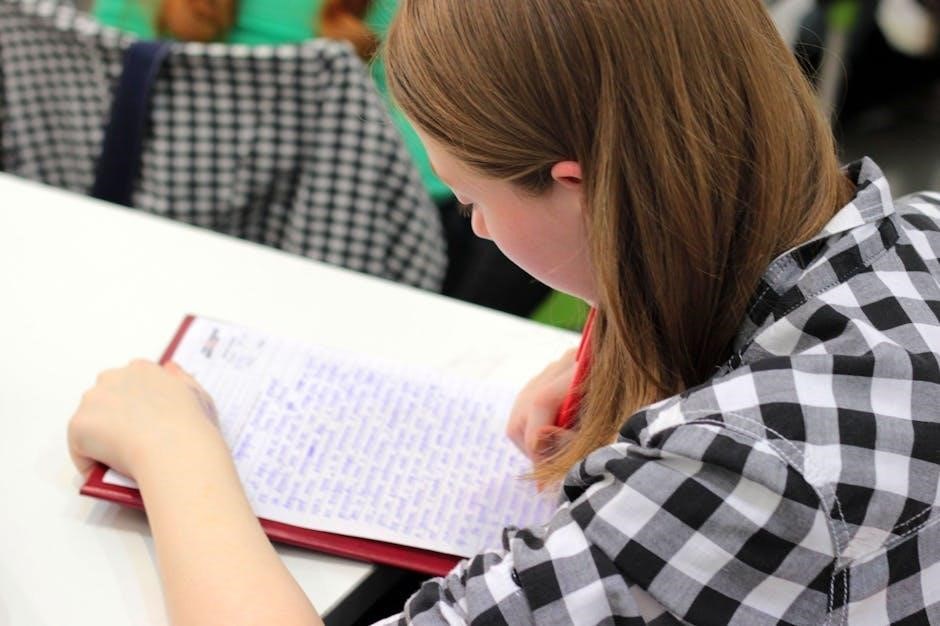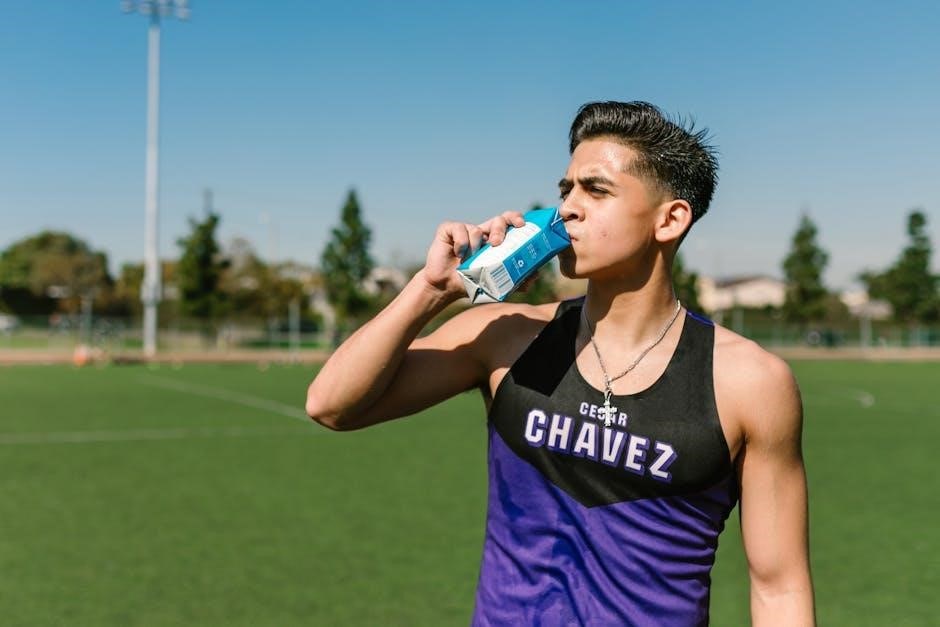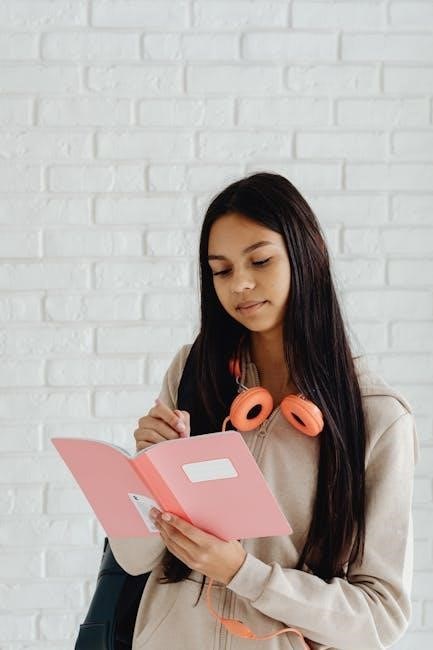The 7 Habits of Highly Effective Teens by Sean Covey offers a transformative guide for adolescents to build self-esteem‚ foster positive relationships‚ and develop essential life skills for success․
Overview of the 7 Habits
The 7 Habits of Highly Effective Teens‚ as outlined by Sean Covey‚ provide a holistic framework for adolescents to cultivate self-awareness‚ responsibility‚ and interpersonal skills․ These habits—Be Proactive‚ Begin with the End in Mind‚ Put First Things First‚ Think Win-Win‚ Seek First to Understand‚ Then to Be Understood‚ Synergize‚ and Sharpen the Saw—empower teens to navigate challenges effectively․ Each habit builds on the previous one‚ fostering personal growth‚ better relationships‚ and long-term success․ By mastering these principles‚ teenagers can develop a strong foundation for achieving their goals and becoming confident‚ resilient individuals․ The habits are practical‚ timeless‚ and applicable to all aspects of life‚ making them an essential guide for teens striving to thrive in an ever-changing world․
Importance of Developing Effective Habits in Teenagers
Cultivating effective habits during adolescence is crucial for laying a strong foundation for future success․ Teenagers face significant physical‚ emotional‚ and social changes‚ making it essential to develop skills that promote resilience and self-awareness․ Effective habits help teens manage time‚ prioritize tasks‚ and build positive relationships‚ which are vital for academic performance and personal growth․ By fostering proactive behavior‚ clear goal-setting‚ and empathy‚ these habits enable teenagers to navigate challenges confidently․ Developing such habits early on equips them with the tools to make better decisions‚ improve self-esteem‚ and maintain a healthy work-life balance․ Ultimately‚ these habits empower teens to become responsible‚ motivated‚ and well-rounded individuals prepared to thrive in an increasingly complex world․

Be Proactive
Being proactive empowers teenagers to take responsibility for their choices and actions‚ fostering self-awareness and personal accountability to overcome life’s challenges effectively․

Understanding Personal Responsibility
Personal responsibility is the foundation of being proactive‚ enabling teenagers to take charge of their actions and decisions․ It involves recognizing that choices have consequences and embracing accountability for one’s life; Proactive individuals understand that they are the primary influence over their outcomes‚ rather than blaming external circumstances․ This mindset fosters self-awareness‚ helping teens identify their circle of influence and focus on what they can control․ By taking ownership of their mistakes and successes‚ teenagers build resilience and integrity․ Personal responsibility encourages intentional decision-making‚ empowering teens to align their actions with their values and goals․ This habit is essential for developing self-discipline and a growth mindset‚ ultimately leading to greater confidence and effectiveness in navigating life’s challenges․
Differentiating Between Circle of Influence and Circle of Concern
Understanding the distinction between the Circle of Influence and the Circle of Concern is crucial for teenagers to focus their energy effectively․ The Circle of Influence includes things they can control‚ such as their attitudes‚ reactions‚ and actions․ In contrast‚ the Circle of Concern encompasses broader issues over which they have little or no control‚ like global events or others’ behaviors․ By prioritizing efforts within their Circle of Influence‚ teens can reduce stress and increase productivity․ This habit encourages them to channel their time and energy into meaningful‚ impactful actions rather than wasting it on things beyond their control․ This mindset fosters a sense of empowerment and clarity‚ helping teens focus on what truly matters․
Practical Steps to Take Control of Your Life
Taking control of your life begins with small‚ actionable steps․ Start by identifying areas you can influence‚ such as your reactions to challenges or your daily choices․ Set clear‚ achievable goals and break them into manageable tasks․ Practice self-awareness by reflecting on your thoughts and emotions‚ and replace negative self-talk with positive affirmations․ Use tools like a planner or app to organize your time and priorities․ Surround yourself with supportive people who encourage growth․ Finally‚ take consistent action‚ even if progress is slow․ By focusing on what you can control and taking proactive steps‚ you empower yourself to create positive change and build a fulfilling life․

Begin with the End in Mind
Begin with the end in mind by defining your personal vision and long-term goals․ Align your daily actions with this vision to create a purposeful life․
Setting Long-Term Goals
Setting long-term goals involves envisioning your future and defining what you want to achieve․ This helps create a roadmap for personal growth and success․ By identifying these goals‚ teenagers can focus on what truly matters‚ whether it’s academic success‚ building meaningful relationships‚ or developing personal skills․ Goals should be specific‚ measurable‚ and attainable‚ allowing for a clear direction․ Regular reflection and adjustment of these goals ensure they remain relevant and aligned with one’s values․ This habit encourages teenagers to think critically about their aspirations and take proactive steps toward realizing them‚ fostering a sense of purpose and direction in life․
Creating a Personal Mission Statement
A personal mission statement is a concise expression of your core values‚ beliefs‚ and long-term goals․ It serves as a guiding force‚ helping teenagers stay focused on what truly matters․ By reflecting on their values and aspirations‚ teens can craft a statement that defines their purpose and direction․ This tool encourages self-awareness and intentionality‚ ensuring that daily actions align with broader life goals․ A personal mission statement acts as a compass‚ providing clarity and motivation during life’s challenges․ It is a powerful way to stay true to oneself and make decisions that foster personal growth and fulfillment․
Aligning Daily Actions with Long-Term Vision
Aligning daily actions with a long-term vision ensures that teenagers progress steadily toward their goals․ By understanding the importance of each task‚ teens can prioritize activities that support their mission statement․ This habit encourages them to avoid distractions and stay focused on what truly matters․ Regular reflection on daily choices helps maintain alignment with their vision‚ fostering a sense of purpose and direction․ Over time‚ this practice builds discipline and accountability‚ empowering teens to achieve their aspirations and create a meaningful future․ Consistent alignment between actions and goals cultivates a proactive mindset‚ essential for long-term success․

Put First Things First
This habit teaches teenagers effective time management by prioritizing tasks‚ focusing on what’s truly important‚ and reducing stress through organized planning․
Time Management for Teenagers
Effective time management is crucial for teenagers to balance school‚ extracurricular activities‚ and personal life․ Sean Covey’s guide emphasizes organizing tasks‚ prioritizing‚ and avoiding procrastination․ By using tools like planners or digital apps‚ teens can efficiently allocate time for studies‚ hobbies‚ and relaxation․ This habit encourages focusing on what’s truly important‚ reducing stress‚ and achieving long-term goals․ Prioritizing tasks helps teenagers avoid last-minute rushes and maintain a healthy work-life balance․ By mastering this skill‚ teens can enhance productivity‚ reduce overwhelm‚ and create space for personal growth and enjoyment․ Time management is a cornerstone for success‚ enabling teenagers to take control of their schedules and thrive in all areas of life․
Understanding the Time Management Matrix
The Time Management Matrix‚ introduced by Stephen Covey‚ categorizes tasks into four quadrants: urgent and important‚ important but not urgent‚ urgent but not important‚ and neither urgent nor important․ For teenagers‚ this tool helps prioritize effectively․ Tasks in the first quadrant‚ such as exams or deadlines‚ require immediate attention․ The second quadrant includes long-term goals and planning‚ which should be scheduled regularly․ The third quadrant often involves distractions‚ like excessive social media use‚ which can be delegated or minimized․ The fourth quadrant includes time-wasting activities that should be eliminated․ By focusing on what’s truly important and minimizing distractions‚ teens can optimize their time‚ reduce stress‚ and achieve their goals more efficiently․ This matrix is a powerful framework for balancing productivity and well-being․
Prioritizing Tasks Effectively
Prioritizing tasks is a critical skill for teenagers to master‚ enabling them to manage their time wisely and achieve their goals․ By focusing on what’s truly important‚ teens can reduce stress and increase productivity․ Start by identifying tasks that align with long-term goals and values‚ such as studying for exams or practicing a hobby․ Use the Eisenhower Matrix to categorize tasks into four quadrants: urgent and important‚ important but not urgent‚ urgent but not important‚ and neither․ Focus on the first two quadrants‚ delegate or minimize the third‚ and eliminate the fourth․ Break larger tasks into smaller‚ manageable steps to avoid overwhelm․ Regularly review and adjust priorities to stay on track․ Effective prioritization helps teens balance academics‚ extracurriculars‚ and personal growth․

Think Win-Win
Focuses on mutual benefit‚ fostering positive relationships by considering others’ needs while achieving personal goals‚ enhancing trust and cooperation in all interactions and opportunities․
Building Positive Relationships
Building positive relationships is a cornerstone of the “Think Win-Win” habit‚ fostering trust‚ respect‚ and cooperation․ By valuing others’ needs and perspectives‚ teenagers can create strong‚ meaningful connections․ This mindset encourages empathy‚ active listening‚ and kindness‚ helping teens navigate social challenges effectively․ Positive relationships not only enhance personal well-being but also contribute to a supportive environment․ Sean Covey emphasizes that win-win interactions promote mutual benefit‚ leading to lasting friendships and improved communication․ By prioritizing others’ feelings and interests‚ teens can build a network of trust and understanding‚ which is essential for personal and social growth․ This habit helps teenagers become more thoughtful and compassionate individuals‚ fostering a culture of inclusivity and respect in their communities․ It is a vital skill for long-term success and happiness․
Understanding the Concept of Win-Win
The “Think Win-Win” habit revolves around the idea of seeking mutually beneficial solutions where everyone involved gains value․ It requires a mindset shift from competition to collaboration‚ focusing on long-term relationships over short-term gains․ Win-win is about understanding that success is not a zero-sum game; one person’s success does not diminish another’s․ By fostering trust‚ respect‚ and open communication‚ teenagers can create environments where everyone feels valued and empowered․ This approach encourages problem-solving through teamwork‚ empathy‚ and creativity‚ leading to stronger‚ more resilient relationships․ Understanding win-win helps teens move beyond selfishness and adopt a more inclusive‚ cooperative way of interacting with others‚ ultimately fostering a culture of mutual support and shared success․ This mindset is essential for personal and collective growth․
Practicing Empathy and Kindness
Empathy and kindness are essential for building strong‚ positive relationships․ Empathy involves understanding and sharing the feelings of others‚ while kindness is about showing compassion and goodwill․ By practicing these traits‚ teenagers can create a supportive environment where everyone feels valued․ This habit encourages active listening‚ open-mindedness‚ and genuine concern for others’ well-being․ Kindness fosters trust and cooperation‚ helping teens navigate social challenges and conflicts more effectively․ Empathy also promotes emotional intelligence‚ allowing teenagers to better understand their own feelings and those of others․ By incorporating these practices into daily interactions‚ teens can cultivate meaningful connections and contribute to a more harmonious and inclusive community․ These qualities are vital for personal growth and fostering a positive impact on the world around them․

Seek First to Understand‚ Then to Be Understood
This habit emphasizes understanding others before seeking to be understood․ It encourages active listening‚ asking questions‚ and clarifying thoughts to build trust and deeper connections․
Effective Communication Skills
Effective communication is a cornerstone of successful relationships and personal growth for teenagers․ It involves expressing thoughts clearly‚ actively listening‚ and being empathetic․ By practicing these skills‚ teens can convey their ideas confidently‚ avoid misunderstandings‚ and build stronger connections with others․ Developing these abilities helps them navigate social situations‚ resolve conflicts‚ and collaborate effectively in team settings․ Cultivating open and honest communication fosters mutual respect and understanding‚ which are essential for both personal and professional success․ As highlighted in Sean Covey’s guide‚ mastering communication skills is a key habit for teens to thrive in all areas of life․
Active Listening for Teenagers
Active listening is a vital skill that enables teenagers to deeply understand others’ perspectives‚ fostering empathy and stronger relationships․ It involves giving full attention to the speaker‚ avoiding interruptions‚ and showing genuine interest․ This habit helps teens build trust‚ resolve conflicts‚ and gain valuable insights․ By focusing on the speaker’s words‚ tone‚ and body language‚ they can grasp the underlying emotions and needs․ Regular practice of active listening enhances their ability to communicate effectively and connect meaningfully with others․ As emphasized in Sean Covey’s guide‚ this skill is essential for personal growth and fostering positive interactions in all areas of life‚ making it a cornerstone of effective communication․
Expressing Yourself Clearly
Expressing yourself clearly is a cornerstone of effective communication‚ empowering teenagers to convey their thoughts and feelings with confidence and precision․ It involves using straightforward language‚ organizing ideas logically‚ and being mindful of tone and body language․ Clear expression helps avoid misunderstandings‚ builds trust‚ and strengthens relationships․ By practicing articulation and honesty‚ teens can assert themselves effectively while respecting others’ perspectives․ This skill fosters personal growth‚ as it encourages self-awareness and the ability to navigate complex social situations․ Mastery of clear communication is essential for teenagers to voice their opinions‚ set boundaries‚ and collaborate successfully in various aspects of life‚ making it a vital component of the 7 Habits framework․
Synergize
Synergize is the habit of teamwork and collaboration‚ where teens combine strengths to create solutions greater than individual efforts‚ valuing diverse perspectives for collective success․

Power of Teamwork
Teamwork is a powerful tool for teenagers to achieve shared goals and build strong relationships․ By combining individual strengths‚ teens can create solutions that surpass what they could accomplish alone․ Collaboration fosters mutual respect‚ trust‚ and communication‚ essential for overcoming challenges․ Synergy emerges when diverse perspectives and skills come together‚ leading to innovative ideas and collective success․ Teamwork teaches teens to value others’ contributions‚ resolve conflicts constructively‚ and grow from shared experiences․ It prepares them for real-world scenarios where collaboration is key to achieving personal and professional goals․ By embracing teamwork‚ teenagers learn to leverage their unique abilities while supporting others‚ creating a win-win environment for all․
Benefits of Collaboration
Collaboration offers numerous benefits for teenagers‚ fostering growth and success in various aspects of life․ By working together‚ teens develop strong communication skills‚ learn to value diverse perspectives‚ and build trust․ Shared efforts enhance problem-solving abilities‚ as collective brainstorming leads to creative solutions․ Collaboration also promotes empathy and understanding‚ helping teens appreciate others’ strengths and weaknesses․ It teaches the importance of compromise and mutual respect‚ essential for maintaining healthy relationships․ Moreover‚ collaboration prepares teenagers for future professional environments‚ where teamwork is often crucial․ By embracing collaboration‚ teens can achieve greater outcomes‚ strengthen social bonds‚ and gain confidence in their ability to contribute effectively within a group setting․
Resolving Conflicts Constructively
Resolving conflicts constructively is a vital skill for teenagers‚ helping them navigate disagreements in a healthy and respectful manner․ By practicing active listening and seeking to understand others’ perspectives‚ teens can address issues without escalating tensions․ Staying calm and communicating openly fosters an environment where both parties feel heard․ Encouraging teens to focus on solutions rather than blame helps shift the conversation from argument to resolution․ Teaching them to express their feelings without attacking others promotes empathy and mutual respect․ Additionally‚ learning to apologize and forgive when necessary strengthens relationships and builds trust․ These strategies empower teenagers to handle conflicts in a way that fosters understanding and growth‚ rather than division or resentment․

Sharpen the Saw
Sharpen the Saw emphasizes self-care and balance‚ helping teenagers maintain physical‚ emotional‚ social‚ and spiritual well-being while continuously improving themselves․
Self-Care for Teenagers
Self-care is essential for teenagers to maintain balance in their lives․ It involves nurturing physical‚ emotional‚ social‚ and spiritual well-being․ By engaging in regular exercise‚ mindfulness practices‚ and hobbies‚ teens can recharge and stay energized․ Prioritizing sleep and healthy eating habits also supports overall health․ Emotional well-being can be fostered through journaling‚ meditation‚ or talking to trusted friends and family․ Social self-care includes building positive relationships and spending time with loved ones․ Spiritual growth can come from reflection‚ community service‚ or personal values․ By consistently practicing self-care‚ teenagers can enhance their resilience‚ focus‚ and ability to grow personally and academically․ This habit encourages teens to take ownership of their health and happiness‚ fostering a strong foundation for long-term success․
Balancing Physical‚ Emotional‚ Social‚ and Spiritual Health
Balancing physical‚ emotional‚ social‚ and spiritual health is crucial for teenagers to achieve holistic well-being․ Physically‚ regular exercise‚ healthy nutrition‚ and adequate sleep lay the groundwork for energy and vitality․ Emotionally‚ practices like mindfulness‚ journaling‚ and seeking support from loved ones help manage stress and build resilience․ Socially‚ nurturing relationships through communication and empathy fosters a sense of belonging and support․ Spiritually‚ engaging in activities that align with personal values‚ such as volunteering or meditation‚ provides purpose and fulfillment․ By integrating these dimensions‚ teens can create a balanced lifestyle that supports their overall development and prepares them for future challenges․ This equilibrium is key to unlocking potential and maintaining harmony in a busy world․
Continuous Self-Improvement
Continuous self-improvement is essential for teenagers to grow and thrive․ It involves setting personal goals‚ reflecting on progress‚ and actively seeking ways to enhance skills and character․ By dedicating time to learning from mistakes‚ teens can develop resilience and a growth mindset․ Engaging in activities like reading‚ journaling‚ or practicing mindfulness fosters self-awareness and emotional intelligence․ Regular physical exercise and healthy habits also contribute to overall well-being․ Teens should embrace lifelong learning‚ seeking feedback from trusted mentors and peers to refine their abilities․ This habit encourages teens to take ownership of their personal and intellectual growth‚ ensuring they remain adaptable and prepared for life’s challenges․ Consistent effort in self-improvement cultivates confidence and a proactive approach to achieving long-term success․
Mastering the 7 Habits empowers teenagers to achieve personal growth‚ strengthen relationships‚ and embrace lifelong success by consistently applying these principles in their daily lives․
Recap of the 7 Habits
The 7 Habits of Highly Effective Teens provide a holistic framework for personal growth and success․ Be Proactive emphasizes taking responsibility for one’s life․ Begin with the End in Mind encourages setting clear‚ long-term goals․ Put First Things First teaches effective time management and prioritization․ Think Win-Win fosters positive relationships through mutual respect․ Seek First to Understand‚ Then to Be Understood promotes active listening and empathy․ Synergize highlights the power of teamwork and collaboration․ Finally‚ Sharpen the Saw stresses the importance of self-care and continuous improvement․ Together‚ these habits empower teenagers to navigate life’s challenges with confidence and resilience․
Encouragement for Implementation
Embracing the 7 Habits can transform a teenager’s life‚ fostering confidence‚ resilience‚ and success․ By starting small and practicing consistently‚ teens can gradually incorporate these principles into their daily routines․ Families and educators play a crucial role in supporting this journey‚ offering encouragement and guidance․ The habits are not just theoretical but actionable steps that lead to tangible results․ Teens are empowered to take control of their lives‚ build strong relationships‚ and achieve their goals․ Remember‚ small steps today lead to significant progress tomorrow․ With dedication and perseverance‚ the 7 Habits can become a powerful foundation for a fulfilling and purpose-driven life․

Additional Resources
Explore workbooks‚ guides‚ and online courses to deepen understanding․ Join community groups and access expert advice to help teens and parents implement the 7 Habits effectively․
Recommended Reading
Sean Covey’s The 7 Habits of Highly Effective Teens is a must-read for adolescents seeking self-improvement․ Companion workbooks provide practical exercises for applying the habits․ Stephen R․ Covey’s original book‚ The 7 Habits of Highly Effective People‚ offers deeper insights for adult readers․ Additional resources include guides on time management‚ communication‚ and goal-setting․ International editions and translations ensure accessibility for a global audience․ These materials empower teens to build resilience‚ improve relationships‚ and achieve their potential․ They are widely available in digital formats‚ making them accessible for modern learners․
Online Courses and Workshops
FranklinCovey offers official 7 Habits of Highly Effective Teens workshops‚ providing interactive modules and live sessions․ These courses teach teens to prioritize tasks‚ set goals‚ and improve relationships․ Platforms like Coursera and Udemy feature similar programs focused on habit formation and personal growth․ Many workshops include peer discussions‚ practical exercises‚ and expert guidance․ They cater to diverse learning styles‚ ensuring teens can apply the habits in real-life scenarios․ These resources are ideal for those seeking structured learning environments․ Visit FranklinCovey’s website or explore online platforms for enrollment details and schedules tailored to your needs․
Community Support Groups
Joining community support groups can provide teenagers with a nurturing environment to practice the 7 habits․ These groups‚ often organized by schools or local organizations‚ offer peer support and shared learning experiences․ Many groups are led by trained facilitators who guide discussions and activities based on Sean Covey’s principles․ Participants can share challenges‚ celebrate successes‚ and learn from one another․ Online forums and social media groups also exist‚ connecting teens globally․ These communities foster accountability and motivation‚ helping teens stay committed to personal growth․ Engaging with others who share similar goals strengthens understanding and application of the habits․ Check local listings or FranklinCovey’s resources for nearby groups or virtual options․
